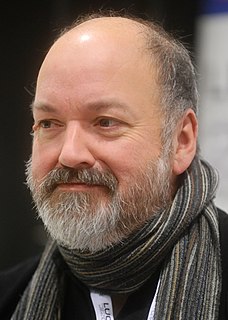
David McKean is an English illustrator, photographer, comic book artist, graphic designer, filmmaker and musician. His work incorporates drawing, painting, photography, collage, found objects, digital art, and sculpture. McKean's projects include illustrating books by authors such as Neil Gaiman, Grant Morrison, Heston Blumenthal, Ray Bradbury and Stephen King, and directed three feature films.

Niall Campbell Ferguson is a Scottish-American historian based in the United States who is the Milbank Family Senior Fellow at the Hoover Institution at Stanford University and a senior fellow at the Belfer Center for Science and International Affairs at Harvard University. Previously, he was a professor at Harvard University, the London School of Economics, New York University, a visiting professor at the New College of the Humanities, and a senior research fellow at Jesus College, Oxford, England.

The Löwenmensch figurine, also called the Lion-Human of Hohlenstein-Stadel, is a prehistoric ivory sculpture discovered in Hohlenstein-Stadel, a German cave in 1939. The German name, Löwenmensch, meaning "lion-person" or "lion-human", is used most frequently because it was discovered and is exhibited in Germany.
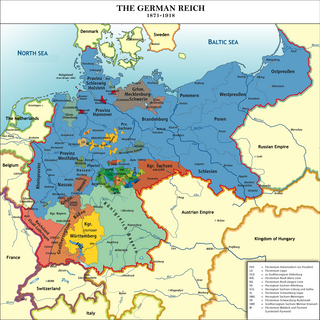
The unification of Germany into the German Empire, a Prussian-dominated nation state with federal features, officially occurred on 18 January 1871 at the Palace of Versailles in France. Princes of most of the German-speaking states gathered there to proclaim King Wilhelm I of Prussia as German Emperor during the Franco-Prussian War.
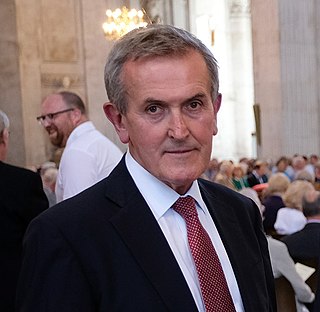
Robert Neil MacGregor is a British art historian and former museum director. He was editor of the Burlington Magazine from 1981 to 1987, then Director of the National Gallery, London, from 1987 to 2002, Director of the British Museum from 2002 to 2015, and founding director of the Humboldt Forum in Berlin until 2018.

Sir Richard John Evans is a British historian of 19th- and 20th-century Europe with a focus on Germany. He is the author of eighteen books, including his three-volume The Third Reich Trilogy (2003–2008). Evans was Regius Professor of History at the University of Cambridge from 2008 until his retirement in 2014, and President of Cambridge's Wolfson College from 2010 to 2017. He has been Provost of Gresham College in London since 2014. Evans was appointed Knight Bachelor for services to scholarship in the 2012 Birthday Honours.

The Cyrus Cylinder is an ancient clay cylinder, now broken into several pieces, on which is written a declaration in Akkadian cuneiform script in the name of Persia's Achaemenid king Cyrus the Great. It dates from the 6th century BC and was discovered in the ruins of the ancient Mesopotamian city of Babylon in 1879. It is currently in the possession of the British Museum, which sponsored the expedition that discovered the cylinder. It was created and used as a foundation deposit following the Persian conquest of Babylon in 539 BC, when the Neo-Babylonian Empire was invaded by Cyrus and incorporated into his Persian Empire.
Sonderweg refers to the theory in German historiography that considers the German-speaking lands or the country of Germany itself to have followed a course from aristocracy to democracy unlike any other in Europe.

Repatriation is the return of cultural property, often referring to ancient or looted art, to their country of origin or former owners. The disputed cultural property items are physical artifacts of a group or society that were taken by another group, usually in an act of looting, whether in the context of imperialism, colonialism or war. The contested objects vary widely and include sculptures, paintings, monuments, objects such as tools or weapons for purposes of anthropological study, and human remains.

The Bode-Museum, formerly called the Kaiser-Friedrich-Museum, is a listed building on the Museum Island in the historic centre of Berlin. It was built from 1898 to 1904 by order of German Emperor William II according to plans by Ernst von Ihne in Baroque Revival style. The building's front square featured a memorial to German Emperor Frederick III, which was destroyed by the East German authorities. Currently, the Bode-Museum is home to the Skulpturensammlung, the Museum für Byzantinische Kunst and the Münzkabinett. As part of the Museum Island complex, the Bode-Museum was inscribed on the UNESCO World Heritage List in 1999 because of its outstanding architecture and testimony to the development of museums as a cultural phenomenon in the late 19th and early 20th centuries.
Rory MacLean FRSL is a British-Canadian historian and travel writer who lives and works in Berlin and the United Kingdom. His best known works are Stalin’s Nose, a travelogue through eastern Europe after the fall of the Berlin Wall; Magic Bus, a history of the Asia Overland hippie trail; and Berlin: Imagine a City, a portrait of that city over 500 years. In 2019 John le Carré wrote that MacLean "must surely be the outstanding, and most indefatigable, traveller-writer of our time."

Our Top Ten Treasures was a 2003 special episode of the BBC Television series Meet the Ancestors which profiled the ten most important treasures unearthed in Britain, as voted for by a panel of experts from the British Museum.

A History of the World in 100 Objects was a joint project of BBC Radio 4 and the British Museum, consisting of a 100-part radio series written and presented by British Museum director Neil MacGregor. In 15-minute presentations broadcast on weekdays on Radio 4, MacGregor used objects of ancient art, industry, technology and arms, all of which are in the British Museum's collections, as an introduction to parts of human history. The series, four years in planning, began on 18 January 2010 and was broadcast over 20 weeks. A book to accompany the series, A History of the World in 100 Objects by Neil MacGregor, was published by Allen Lane on 28 October 2010. The entire series is also available for download along with an audio version of the book for purchase. The British Museum won the 2011 Art Fund Prize for its role in hosting the project.

Hornedjitef was an ancient Egyptian priest in the Temple of Amun at Karnak during the reign of Ptolemy III. He is known from his elaborate coffins, mummy mask and mummy, dating from the Early Ptolemaic Period and excavated from Asasif, Thebes, Egypt, which are all held in the British Museum. These related objects were chosen as the first of the hundred objects selected by British Museum Director Neil MacGregor in the 2010 BBC Radio 4 series A History of the World in 100 Objects.

Hedwig glasses or Hedwig beakers are a type of glass beaker originating in the Middle East or Norman Sicily and dating from the 10th-12th centuries AD. They are named after the Silesian princess Saint Hedwig (1174–1245), to whom three of them are traditionally said to have belonged. So far, a total of 14 complete glasses are known. The exact origin of the glasses is disputed, with Egypt, Iran and Syria all suggested as possible sources; if they are not of Islamic manufacture they are certainly influenced by Islamic glass. Probably made by Muslim craftsmen, some of the iconography is Christian, suggesting they may have been made for export or for Christian clients. The theory that they instead originate from Norman Sicily in the 11th century was first fully set out in a book in 2005 by Rosemarie Lierke, and has attracted some support from specialists.
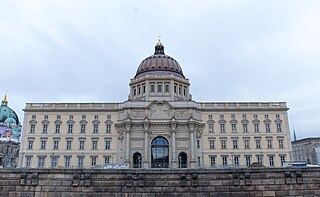
The Humboldt Forum is a museum dedicated to human history, art and culture, located in the Berlin Palace on the Museum Island in the historic centre of Berlin. It is in honour of the Prussian scholars Wilhelm and Alexander von Humboldt. Considered the "German equivalent" of the British Museum, the Humboldt Forum houses the non-European collections of the Berlin State Museums, temporary exhibitions and public events. Due to the COVID-19 pandemic, it opened digitally on 16 December 2020 and became accessible to the general public on 20 July 2021.
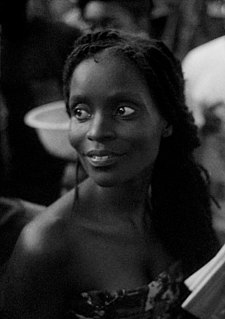
Nana Oforiatta Ayim is a Ghanaian writer, art historian and filmmaker.

Living with the Gods is a 30-part BBC Radio 4 series presented by Neil MacGregor, a former director of the British Museum. It explores human societies and what MacGregor describes as "the connections between structures of belief, and the structures of society". The series examines artefacts from the 40,000 year-old Lion-man sculpture to the contemporary Lampedusa Cross created by Francisco Tuccio in response to the 2013 drowning of refugees off the island of Lampedusa.
Edmund Fawcett is a British political journalist and author. He worked at The Economist (1973–2003) as chief correspondent in Washington, Paris, Berlin and Brussels, as well as European and literary editor. In a long career covering international politics, he wrote about the growth of the European Union, democratisation in Spain, Portugal and Greece, the end of the Cold War, new hopes for the United Nations, Germany's unification and the wars in ex-Yugoslavia. In the United States, he travelled widely, followed three presidential campaigns and wrote about the decline of detente in the late 1970s together with the rise of Reaganism. His frequent book reviews have appeared in The New York Times, Guardian and New Statesman, Times Literary Supplement and Political Quarterly.
Wolf Burchard is a British-German art historian and museum curator. He joined the Metropolitan Museum of Art in New York City in 2019, where he is responsible for British decorative arts.















